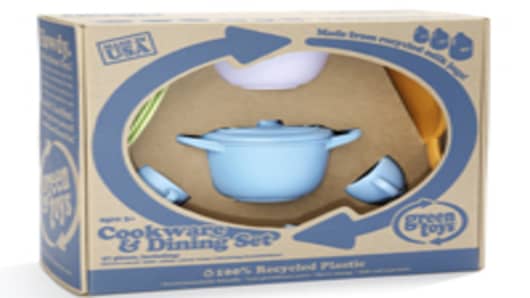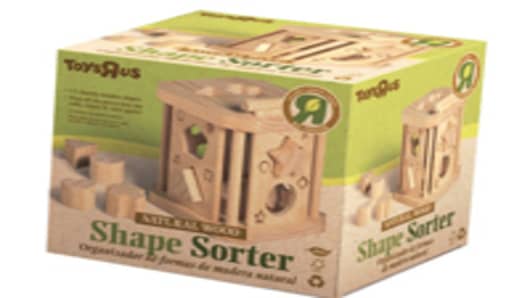Growing safety concerns over children's toys have spiked interest in the eco-friendly toy sector and companies are moving quickly to tap into the growing market.
Even though eco-friendly toys make up a pittance of the $22 billion business in the U.S., consumer interest is growing.
"All the reports from the media, from what children are learning in school, green consciousness is something that's become a major element of the U.S. culture today," says Chris Byrne, an independent toy analyst at Byrne Communications. "Consumers are more likely to think positively of companies and brands that are going green."
FAO Schwarz, for instance, is showcasing a new line of such toys. One of its vendors, Green Toys, makes toys from recycled plastic milk containers. The company reprocesses plastic milk jugs, a high-density polyethylene, which it says is one of the safest, cleanest plastics around. Products include an indoor gardening kit, cookware and dining set and sand play set. (Video: Natalie Erlich on how toymakers are going green)
"It used to be just this anonymous toy in this box," says Robert von Goeben, Green Toys co-founder. "Consumers are now looking at toys and saying 'What's in that product? What's it made out of?'"
FAO Schwarz is also expanding its own line of green toys.
"We think it fits well with our brand, in terms of the quality of the product, also in terms of our customer base," says FAO Schwarz CEO Ed Schmults.
Green toys appeal mostly to parents who already incorporate green into their lifestyles, says Byrne.
"They're not the hummer drivers; they're more of the hybrid drivers."
For environmentally conscious parents, green toys are a win-win situation; they believe they are safe for children and easy on the environment.
"The security of knowing that your child is playing with something that is eco-friendly, human-friendly, pet-friendly, I would be willing to spend more, $15 to $20 more," says Jasmine Parks, a mother from San Diego, during a recent trip to Schwarz's New York store. "It's not much more, to buy them something that's safe and non-toxic and organic."
Big box retailer Toys "R" Us also sells eco-friendly toys. The company's "Good Green Fun" campaign includes plush animals, cotton dolls and wooden toys bearing a green "R" logo with the words "Recycle, Renew, Reuse, Re-think." The toys are packaged in earth-toned materials that are at least 70 percent recycled.
The green toy movement comes amid government efforts to impose tougher safety standards following last year's toy recalls. Washington State, for instance, passed a law restricting the amount of lead in toys, which has sparked some opposition from the toy industry.
Although most agree that green toys are easier on the environment, some industry experts don't believe they necessarily mean a safer product.
"If you're using recycled material it's going to go through the same tests as non-recycled material," says Malcolm Denniss, a quality assurance expert at SGS Group's toy division. "I don't think there's any more or less difference in safety."
Despite mixed reviews within the toy industry, the eco-friendly sector is becoming increasingly more commercial.
"For years, from the '50s on, the conventional wisdom was the bigger the box, the better the toy," says Byrne. "But now people associate green or the using of less materials with value."




